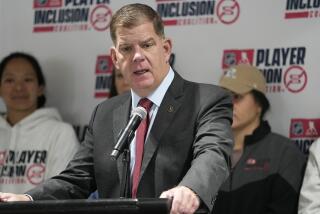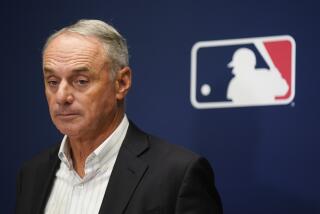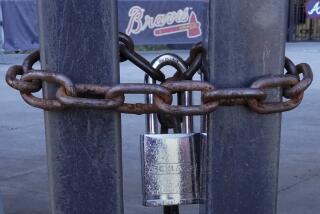NHL’s Talks Going Down to the Wire : Labor: Both sides meet late into the night in an effort to avert first canceled season in major league sports history. Deadline is noon today.
- Share via
NEW YORK — The last-gasp opportunity to avoid cancellation of the National Hockey League season--set for noon today-- began here Monday morning. Management and the locked-out players were trying to negotiate a collective bargaining agreement and, as of 8 p.m., there was no word if they had made any progress. But they were still meeting.
Both sides headed into Monday’s session saying that there was little reason for optimism. The 78-year-old NHL would become the first major professional sports league to cancel an entire season. But they said they had to try one last time to end this bitter labor impasse, which began when the old contract expired on Sept. 15, 1993, and escalated when management locked out the players the day before the 1994-95 season was to start on Oct. 1.
“The only reason I hold out hope,” Andy Moog, a union vice-president and Dallas Star goaltender, told the Dallas Morning News, “is the absolute chaos and total destruction that will occur if the season is canceled. There will be nothing but losses on both sides.”
Peter Karmanos, owner of the Hartford Whalers, was quoted as saying the cost of a canceled season would total between $250 million and $350 million, although it’s difficult to predict, since it would be unprecedented. The league has said its 26 clubs collectively lost nearly $70 million the past two seasons.
At issue was management’s desire to link expenditures to revenues, specifically by slowing the rapid escalation of player salaries. Those salaries, the league has said, have increased 140 percent over five years, to an average of $558,000 last season. There are roughly 650 players in the union, and--signing and reporting-to-training-camp bonuses aside--they get paid only during the regular season. (Injured players have been paid during the lockout.)
If, somehow, a deal were struck, a shortened schedule would begin next Monday. Each team would play 50 games, down from an original 84. The regular season would be followed by a full playoff schedule that would end no later than July 1. Those conditions were mandated by the league’s Board of Governors last month.
When hockey’s labor talks heated up in earnest in August, management wanted to negotiate a hard salary cap into its labor agreement. The players balked, so management turned to a tax on team payrolls, as a vehicle to stem the rising player salaries.
But the players have called that a salary cap in disguise, and said there would be no deal with a tax either. Subsequently, negotiations have centered around three issues: free agency, salary arbitration and entry-level salaries. Those issues are the basis for each party’s most recent contract proposals.
Monday’s talks came after a week in which each party rejected the other’s “final offer.” On Wednesday, the players issued their proposal. Management rejected it on Saturday and came up with a counterproposal. The players rejected the counterproposal on Sunday.
The negotiators began meeting Monday at 11 a.m. at the Four Seasons hotel, sources said. NHL Commissioner Gary Bettman and NHLPA Executive Director Bob Goodenow were there, but no other representatives could be confirmed. However, the sources said, NHL general counsel Jeff Pash and union lawyers Bob Riley and John McCambridge also were in attendance.
More to Read
Go beyond the scoreboard
Get the latest on L.A.'s teams in the daily Sports Report newsletter.
You may occasionally receive promotional content from the Los Angeles Times.






